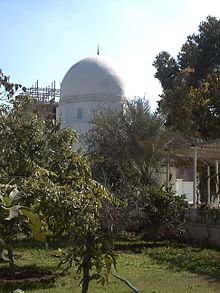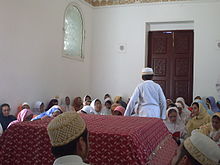- Malik al-Ashtar
-
Malik Al-Ashtar (Arabic:مالك الأشتر) was one of the most loyal companions of Ali Ibn Abi Talib, the cousin of Muhammad. Al-Ashtar became a Muslim during Muhammad's time and rose to prominence during the caliphates of Uthman and Ali. During the caliphate of Ali he fought in the Battle of Jamal and Siffin during the first Fitna in Ali's Islamic defence. He is recognized for his fierce and steadfast defense of Islam in battle as well as his pious nature. The appellation of "Al-Ashtar" is Arabic meaning cut, torn or ripped. He earned the title of "Al-Ashtar" from a battle scar he received on his lower eyelid during the Battle of Yarmouk.[1]
Contents
Serving in Ali's Caliphate
One of the fiercest warriors of his time, he served Ali like no one else.extraordinarily He was appointed Governor of Egypt in 658 (38 A.H.) by ʻAlī ibn Abī-Tālib, the caliph of the Muslims, after the Battle of Siffin had ended. At that time, Amr ibn al-As had 6,000 soldiers who were on their way, sent by the governor of Damascus, Muʻāwiyya. ʻAlī was asked to send help. ʻAlī's best general and childhood friend, Malik Al-Ashtar, was sent to defend his stepson, the former Governor of Egypt, Muhammad ibn Abu Bakr, since ʻAlī believed only Malik could beat Muʻāwiyya and Amr ibn al-As. Muhammad ibn Abū-Bakr was instructed to return to ʻAlī's capital city, Kufa. However, Malik died on his way to Egypt. The Shi’a and Wilferd Madelung believe that Malik was poisoned by Muawiyah I. His Mosouleum is build there,photo placed here.
Descendants
Among his descendants are the Kalbasi family, who reside in Iran and some are living in Iraq. One branch of this family adds the title "Ashtari" to the end of their family name to denote this fact.
In Lebanon, the Hamadani (branched to Sabbagh) family are also direct descendants who have maintained a family tree dating back to the Nakha'i tribe origins. The Mroueh family, after tracing their lineage, are also believed to be descendants.
References
External links
List of Ali's companions Abdullah ibn Hashim
`Abd Allah ibn `Abbas
Abu al-Aswad al-Du'ali
Abu al-Heysam ibn Tayyahan
Abu Dharr al-Ghifāri
Adi ibn Hatim
al-Harith al-A'war al-Hamdani
Ammār ibn YāsirAmr ibn al-Humq al-Khaza'i
Asbagh ibn Nubatah
Bilal ibn Ribah
Habīb ibn Muzāhir
Hamam ibn Shurayh
Hisham ibn 'Utbah
Hujr ibn Adi
Jundab ibn AbdullahKhuzayma ibn Thābit
Kumayl ibn Ziyād
Mālik al-Ashtar
Maytham at-Tammār
Mikhnaf ibn Sulaym
Miqdad ibn Aswad
Muhammad ibn Abi Bakr
Qays ibn Sa'dSalmān the Persian
Sa'sa'ah ibn Suhān
Sulaym ibn Qays
Sulayman ibn Surad
Umm Salamah
Uthmān ibn Hunayf
Uways al-Qarni
Zayd ibn SuhanCategories:- Arab people
- Iraqi Shi'a Muslims
- Yemeni Shi'a Muslims
Wikimedia Foundation. 2010.


